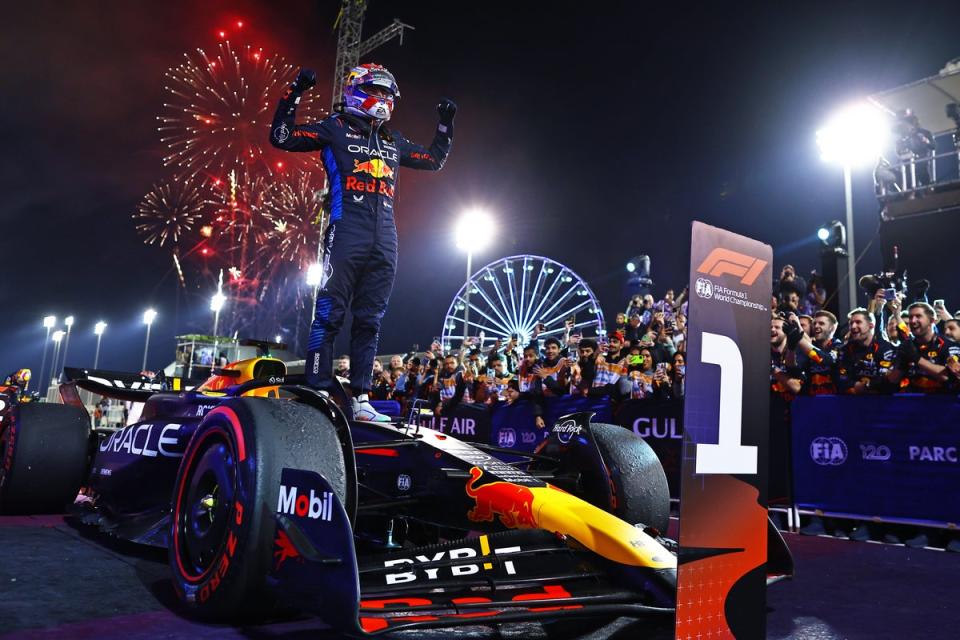Jeremy Clarkson nailed it on Martin Brundle’s F1 grid walk – why is nobody any closer to Red Bull?
In a manner so unashamedly ebullient that no double take was needed on the orator, Jeremy Clarkson took the lead in conversation with Martin Brundle on the Bahrain Grand Prix grid, ahead of the season-opening F1 race. Equally, in his usual forthright manner, the former Top Gear presenter was this time bang on the mark with his early assessment of the 2024 campaign.
“I’ve spent all of today looking at the lap times – this is how boring I am – from last year to this year,” said Clarkson. “And I’m wondering, what have they all been doing over the winter?
“The gaps by and large are the same. McLaren have got a lot better, much closer to Max. Lewis is an anomaly. It’s a strange thing to go from one year to the next and for so little to have changed.”
He’s right. Max Verstappen won last year’s Bahrain Grand Prix with ease, 11 seconds clear of his Red Bull teammate Sergio Perez. This year, irrespective of the high-profile catastrophe engulfing team principal Christian Horner, Verstappen was even more dominant, victorious at a canter with an advantage of 22 seconds again ahead of Perez. Needless to say, the Dutchman also secured a bonus point for the fastest lap.
It all makes for fairly unappetising viewing for both Formula 1 purists and casual watchers of the sport. No matter who you support, the spectacle is no longer engrossing when the victor becomes so inevitable. So early on, too. When pole-sitter Verstappen held off a limp challenge for the lead from Charles Leclerc at turn one, steering his RB20 on the inside line and away, it was game over. Every battle henceforth took place behind him.
By the final 15 laps or so, there was barely an overtake to speak of, as all 20 cars stayed in lane to the finish line. Comically, you could argue that the most entertaining snippet of cars clashing came post race, when a fuming Yuki Tsunoda divebombed his teammate Daniel Ricciardo in frustration after a “team orders” call went against him in the race.
When you’re looking at cool-down laps for your adequate share of Saturday evening entertainment, there’s a problem.

A problem the sport is no longer able to obscure. Make no mistake: sports fans turn off, pronto, when the winner becomes predictable and incontestable. Not even Netflix and the wonder of Drive to Survive can escape the whirring inevitability doom. This year’s season saw a 30.9 per cent drop in audience from 2022; a season which saw Red Bull win every race bar one.
The cause of this most predictable of season starts is of course twofold. You have Red Bull, the new-look RB20 re-choreographed in a shape which raised eyebrows. “It looks like a no-pod Mercedes?!” came the chuckle of intrigue down the pit lane. Had Red Bull taken their design ambitions too far? Should they not have kept it simple and safe, given their unparalleled success last year? Had they actually got it wrong?
Clarkson was right with this as well. Asked who his money was on in Bahrain, the Amazon host smirked with a grin already in resignation of what was forthcoming. He replied: “Adrian Newey.”
Red Bull’s design guru has mastered this phase of ground-effect regulations to near perfection and this year’s iteration, on first viewing, looks an improvement on last year’s rocket ship. The world champions could start development on their 2024 car extremely early last year, with the 2023 title wrapped up by May. In essence, that extra time negated the handicap of the cost-cap punishment given to Horner’s outfit the preceding year, docking them 10 per cent of their car development time.
The supremacy has been incessant in the last two years. Since Red Bull’s one-two finish at Imola in April 2022, Red Bull have won 36 out of 40 races – a success rate of 90 per cent. Newey’s genius – and that of his engineers, who he will be the first to congratulate – has made Red Bull not just F1’s most dominant team in the 74-year history of the competition, but also the leading team in top-class professional sport.
So there’s that: one gigantic hurdle to overcome. But the hope this year was that the hurdle to Ferrari, McLaren and Mercedes would shorten. After two years of trials and tribulations, mistakes and mishaps, surely one of them had got it right? If anything, however, two weeks in Bahrain suggest the deficit has only lengthened.
“Max was in a different galaxy,” stated Mercedes boss Toto Wolff afterward. Jeddah this weekend should suit McLaren’s high-speed strengths, while it may well take Japan in April to see if Mercedes can have any influence on the top table this year. Ferrari look a clear No 2, even if their usual in-race susceptibilities came home to roost once more.
Sure, it’s only race one. A fortnight in Bahrain is not – cannot – be a litmus test for 10 months of racing. But the lack of progress, in this first chapter of a double dozen, is excruciatingly unpalatable.
